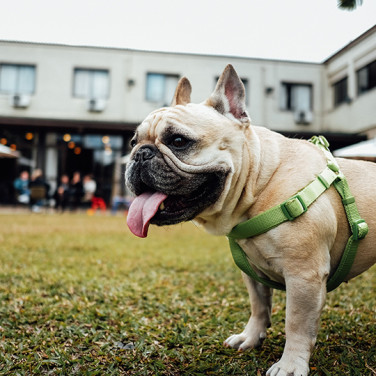FOOD
Can Dogs Eat Crab Meat? Benefits and Risks of Feeding Your Pet Crab
페이지 정보
본문


Can dogs eat crabs? YES!
Crab meat is safe for dogs to eat as it is not toxic to them. The protein in crab meat contains essential amino acids that dogs require, making it a healthy addition to their diet in small amounts. However, there are some precautions to keep in mind when feeding your dog crab meat. Raw crab meat may contain parasites that can upset your dog's stomach, so it's best to cook it thoroughly before serving it to your pet. There is always a risk of an allergic reaction, especially if you have not confirmed a shellfish allergy in your dog. We will go over different ways to safely prepare dog-safe treats, the health benefits, and the cautions to consider when feeding crab meat to your dog. Following this guideline, you can safely incorporate crab meat into your dog's diet and provide them with a tasty and nutritious treat.
What are the health benefits of feeding crab meat to dogs?
Crab meat is a nutritional powerhouse, offering a rich source of protein along with vitamins B2 and B12, minerals such as zinc and selenium, and omega-3 fatty acids. In this article, we will take a closer look at the nutritional characteristics of these ingredients and the benefits they can offer to your dog's health.

-
Protein
Crab meat's lean portion contains protein, which is composed of 10 essential amino acids that dogs cannot produce on their own. These amino acids are crucial for various bodily functions and help in the development of their musculoskeletal system. A small amount of crab in your dog’s diet can offer a great source of protein and essential nutrients they cannot otherwise get on their own.
-
Vitamin B2
Riboflavin, vitamin B2, is a nutrient that is essential for healthy red blood cell production, normal growth, energy production, and maintaining a healthy nervous system.
-
Vitamin B12
Vitamin B12 supports healthy cell growth and nervous system function, while also promoting cognitive function and potentially improving brain function.
-
Zinc
Zinc is essential for dogs to maintain a healthy immune system, proper enzyme function, and healthy skin.
-
Selenium
Selenium plays a crucial role in your dog's antioxidant defense system by acting as an antioxidant and fighting against damage caused by free radicals. It also helps to protect your dog's body cells and tissues.
-
Omega-3
Omega-3 fatty acids play a crucial role in supporting various aspects of your dog's health, such as heart health, skin health, and kidney function. These fatty acids are not only beneficial for your dog's health, but they also serve as an important source of energy for them.
Precautions when feeding crab meat to dogs
While crab meat itself is not toxic to dogs, it still poses several risks that should not be overlooked.

Here are some things to keep in mind when feeding your dog crab meat:
-
Sodium content
Crab meat is known for its high salt and selenium content. While selenium can offer health benefits to dogs in small amounts, excessive consumption can lead to health problems such as high blood pressure and kidney issues. Therefore, it's important to moderate your pet's intake of crab meat to prevent potential health risks.
-
Parasitic infection
Raw crab meat often contains bacteria and intestinal parasites that can cause stomach upset if consumed. Parasites can also infect the gastrointestinal tract and lungs, leading to symptoms such as vomiting, diarrhea, and abdominal pain. To avoid these risks, it is essential to thoroughly cook the crab meat before feeding it to your dog.
-
Crab Allergy
If your dog has a shellfish allergy, it's crucial to know that feeding them crab meat could trigger an allergic reaction. It is always safe to feed a very small amount of any new food item and monitor for any signs of allergy. Keep a watchful eye for symptoms such as itching, swelling, or breathing difficulties. If you notice any of these signs, discontinue feeding and contact your veterinarian immediately.
Signs of an allergic reaction to look out for:
- Skin problems: hives, facial swelling, itchiness
- Digestive problems: vomiting and diarrhea
- Shortness of breath
How to safely prepare crab meat for your dog
-
Serve boiled or grilled
Because raw crab meat may contain parasites and bacteria that can be harmful to puppies, it is recommended to feed them fully cooked crab meat to avoid any potential health risks. Remove all parts of the shell before serving to avoid any choking hazards.
-
Feed only in small amounts
Feeding your dog crab meat can be risky due to its high sodium content, which can lead to stomach upset if consumed in large quantities. To ensure your dog's safety, it's important to proceed with caution. Start by offering your pup a small amount of unseasoned crab meat, such as one teaspoon, and carefully monitor for any signs of allergic reactions or digestive problems.
-
Salt removal
Crabs are naturally high in salt, which can elevate cholesterol levels and lead to high blood pressure if fed to dogs as-is. It is best practice to rinse the crabs in the water and remove as much salt as possible before feeding them to your dog.
Can dogs eat imitation crab meat?
Imitation crab meat, often made from processed white fish and a mix of other additives, can be harmful to dogs due to its high sugar and sodium content, along with other binders and additives. Although a small amount of imitation crab is unlikely to cause serious harm, dogs may experience gastrointestinal distress or vomiting. In addition, fake crabmeat products, including imitation crab sticks made from fish paste, may contain unknown and potentially unhealthy ingredients that can be harmful to dogs. It's best to avoid feeding your furry friend imitation crab meat and opt for safer, healthier protein sources instead.
Wondering if you can feed your dog any other foods besides crab meat?

Does your dog also give you puppy dog eyes when you're snacking on something? You may know that certain foods like chocolate shouldn't be shared with them, but do you always check online to see if it's okay to give them a bite of what you're eating? The Buddydoc Food Dictionary has information on hundreds of human foods and whether they are safe and nutritious for pets. If you want to know more about other foods, try looking them up on Buddydoc!













